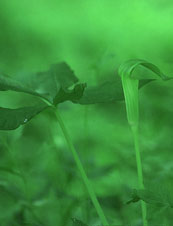More
about Eddie Lunsford’s BIO 111 Class
 Jack
in the Pulpit
Jack
in the Pulpit
Arisaema triphyllum
|
|
Students from an array of programs take
this class. In Arts & Sciences, it may
be used to partially fulfill the natural
sciences requirement or used as an elective.
This is one of my favorite courses to teach.
It provides an introduction to biology and
I usually get to work with students from
a variety of backgrounds. There is no prerequisite
for the class. In other words, I do not
assume previous knowledge about biology.
I find that this class also challenges some
students’ notions about science in
general. A very similar but less detailed
class is BIO 110. A student may not use
both BIO 110 and BIO 111 to fulfill requirements
for the Arts & Sciences degree or core
requirements.
By way of lecture and discussion, films,
group work, projects and lab activities
we study and experience how scientists do
their work, we learn about cells, cell division,
energy, food, classification of organisms,
evolutionary theory, genetics and chemistry
as it pertains to biology. There are four
unit tests and a comprehensive final. Students
are given a set of objectives to guide their
study and preparation for tests. Other grades
include weekly lab reports and worksheets.
There are also two major projects. One is
a written summary of the classification
and descriptions of 20 assigned organisms.
It is a very challenging project and usually
spans about 20 pages in length. Students
need good library and/or internet research
skills to do well with this project. While
challenging, it is filled with opportunities
to learn more about living things. The other
major project is a formal scientific research
paper based on an experimental inquiry completed
in class. The lab work for this project
is most often done in small groups. Students
may decide if they would like to write their
papers alone or with one or more partners.
To be successful in this class, the average
student will complete about 12 hours of
outside study and preparation in addition
to the six hours of weekly class meetings.
Reading ahead in the textbook and reviewing
previous class material is critical to most
students. There are a number of extended
projects. Some span only two class meetings
but others are longer. For example, students
may spend 10 to 14 weeks on the taxonomy
project. It is not unusual for students
to be involved in multiple activities during
any given week. For this reason, good time
management skills and organizational skills
are essential. This is not a class that
usually allows one to put forth minimal
effort and do well. Having the ability to
work well with other students in a cooperative
setting is also a plus for success. Regular
attendance is probably a bit more critical
than for the average college class due to
extended group work in lab. If you are a
person who procrastinates or one who has
problems working without constant supervision,
you may have a very hard time in this course.
I am always willing to help but I see myself
in the role of a facilitator, rather than
a supervisor, in this class.
|